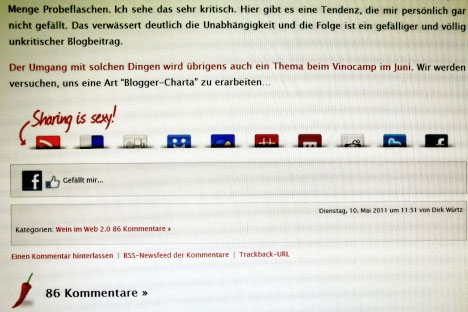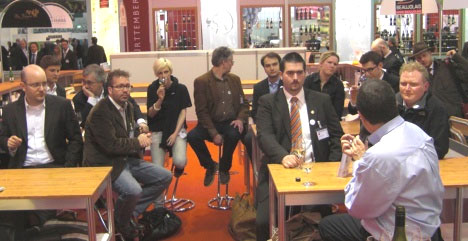Blogging is in. There is hardly a magazine, newspaper, television or radio program that wants to or can do without it. There are also plenty of private bloggers. The "democratization" of the media has started, actually, it is already in full swing. Also in the field of wine journalism. Or better: in writing and discussing about wine. One of the best and most idiosyncratic German wine bloggers, Dirk Würtz, has continued a discussion that was launched in the "Feinschmecker" magazine: "Inflation of the critics"... And promptly comments are hailing, more than ever before, 86 until today.
 |
| Blogger Dirk Würtz% when he is not on the Internet |
Basically, it's about the question of professionalism in journalism, especially wine journalism. This interests me, as I was a journalist all my professional life. Journalist BR, which means: registered in the professional register. In other words: I fed myself and my family exclusively with journalism. That was before the blogging era. But I never wrote about wine. So I'm not a wine journalist. Yet, now I write about wine. So, in this new profession, I'm not "professional", but rather an amateur, in the best sense of the word.
Journalists are not judges either, wine journalists in a certain sense are. They don't judge people, they judge wines. This distinguishes their work from many, even most other journalistic fields. Moreover, they are acting in a particularly sensitive area. The famous imperial thumbs down is no longer fatal, but it can mean loss and financial losses, especially if it is the thumb of a well-known wine critic.
 |
| Imperial gesture: thumbs up% thumbs down |
This has little to do with journalism, much more with gladiatorial combat. But these have been forbidden - in the Roman Empire - since the 5th century. In journalism, the category "criticism" does not really exist, or only marginally. In art, film, theatre and wine, for example. Critics have to be particularly legitimised, through specialist knowledge, but above all through anchoring in the medium in which they publish their opinions and evaluations. The recipients want to know who judges what and how. Public criticism, be it praise or blame, is always closely linked to the critic. Objective criteria marry with subjective acceptance and credibility. And this is where the dams - at least in the wine sector - have long since broken.
Dirk Würtz formulates it in his, usually not exactly squeamish, open way: "....What I sometimes experience there is very strange. Every bored househusband becomes an important wine critic. Writes for "totally important" publications - mostly it is a forum - and penetrates the wine world ...
 |
| Website of Dirk Würtz% which provoked 86 comments |
Such strong stuff was bound to provoke dissent or applause. "Hello Dirk, I think your comments are a bit one-sided..." is the first comment. Immediately the mathematician steps on the scene: "Point 1: If a blogger allows himself to be corrupted by invitations and press events, there is clearly a personal deficit on the part of the writer. Point 2:....." This continues until point 5, followed by the obligatory reference to subjectivity: "The professionalism of a taster, not a journalist, cannot be objectively verified. In the industry, as in many others, both sides, winemaker and critic, benefit from each other." Now, of course, the polarizing statement: "....Auch wine bloggers are slowly but surely being instrumentalized. Here an invitation, there a "press trip", lots of sample bottles. I see this very critically....More courage I wish many fellow bloggers! This "feel-good state"! is unbearable in parts." The idea of a blogger charter comes up. In journalism, too, there are codified principles, something like a code of honour. Why not in the field of bloggers too? "I think the members of the online scene know how to classify blog writers and contributions. Confused are nevertheless rather the colleagues from the PR-agencies, which do not take themselves the time to follow Bloggern and their discussions longer time.... , mean a professional writer. So the PR people also get their share of scolding. In the engaging discussion, it is stated, "...that the pros are not thrilled with this development .... The only possibility would be to call into being a kind of "certification" with round robin tests etc., where there would then at least be some kind of statistical safeguarding of the tasting results...." Aha, certified wine critics, this is still missing. Blog turning reaction: "hahaha......... so now we need a tasting driver's license?! Typical German discussion!!!"
 |
| Wine blogger meeting at ProWein (Image: Blog Weinkaiser) |
I would like to break off here. The discussion continues, of course, it can be read at http://wuertz-wein.de/wordpress/2011/05/10/die-inflation-der-kritiker/. It is worthwhile, even if the discussants are more or less the same again and again and the arguments are also largely known. It is worthwhile to think about the changes in journalism. The classic forms of report, feature, interview, portrait, stories, etc., defined almost since Gutenberg's time, have ended up in a mixing drum from which new creations of journalistic forms are emerging and taking hold in the blogging scene. At first I was horrified: where will we end up when commentary and report, when opinion and fact are mixed together in a motley fashion? In the meantime, I'm almost a convert. I have also met good researchers among bloggers, even if they are (still) in the minority. The classic Anglo-Saxon separation of information and commentary is also being reintroduced here and there. Blogs also increasingly have a "regular audience", which can certainly be compared to subscribers (even if you don't have to pay for it). Even PR and advertising, probably the most sensitive area, are increasingly clearly marked in blogs.
 |
| Professional wine blog of the magazine Vinum |
The new technical possibility of adding blogs to traditional journalism, and especially of opening wide the "letters to the editor" columns, has brought something like a democratization of the information world. Information can flow better. Undoubtedly. And yet there is always a stale aftertaste. Namely when bloggers mutate into judges. When without law and order, without code and guidelines, without control instances and responsibilities, without defense of the accused (Weins) is judged and sentenced. It's not just my sense of justice that resists this, it's my (perhaps idealized) notion of an informed society that resists this.
Sincerely
Yours/Yours